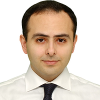Keynote Lectures
(1/2) “SPH for new generation fluid-structure interaction solvers and reliable design of advanced coastal/offshore structures”
Prof. Abbas Khayyer (Kyoto University)

Abstract of Keynote Talk: this talk presents a concise review on state-of-the-art of developments and future perspectives corresponding to FSI solvers developed within the SPH context, with the main focus on coastal/offshore structures. The talk reviews and highlights the potential robustness of entirely Lagrangian meshfree FSI solvers, as new generation computational methods, in reproducing FSI corresponding to extreme events and portrays the future perspectives for systematic developments towards reliable engineering applications with respect to rapid advances in technology and emergence of so-called advanced materials that can result in complex and highly non-linear structural responses. Accordingly, the necessity for reproduction of comprehensive structural responses, including viscoelastic, elastoplastic and progressive damages/failures, by the advanced FSI solvers developed within the SPH context will be highlighted. In this regard, extensions of the structure model are suggested to be conducted in a variationally consistent framework to ensure stability, accuracy and physical reliability including thermodynamic consistency. As an important step for coherent extension of SPH-based structure models towards reproducing viscoelastic structural responses, a brief background of corresponding mathematical & numerical modelling is presented along with some numerical results achieved by an extended Hamiltonian and thus variationally consistent SPH model.
BIO: Dr. Abbas Khayyer is an Associate Professor at Civil and Earth Resources Engineering Department at Kyoto University, Japan, where he was a lecturer from 2009 to 2013. Dr. Khayyer's research interests mainly include Computational Fluid and Structure Dynamics, Particle Methods and Fluid-Structure Interactions. He has published more than 85 peer-reviewed journal papers spanning from renowned Ocean Engineering journals to reputable Computational/Mechanical Engineering ones. Dr. Khayyer has been internationally recognized, e.g., receiving the prestigious C.H. Kim award by International Society of Offshore and Polar Engineers (ISOPE) as well as three research grants as the Principal Investigator from Japan Society for Promotion of Science (JSPS); being invited for several talks in the UK, USA, Japan and China; and serving as Associate Editor or Editorial Board member of several renowned journals. Dr. Khayyer has been internationally active being a member of several reputable societies including the Steering Committee of SPHERIC. He has also been listed as one of the World’s Top 2% Scientists of 2020 & 2021 by Stanford University.
(2/2) “Support in Chrono for simulating automation, robots, and autonomous vehicles”
Prof. Dan Negrut (University of Wisconsin-Madison)

Abstract of Keynote Talk: Chrono is a multi-physics simulation engine whose strength is in multibody dynamics simulation. Chrono supports the 2023 NASA mission in which the VIPER rover will explore the Moon’s South Pole in search of frozen water; and has been adopted by the DoD High Performance Computing Modernization Program as the tool for the simulation of US Army wheeled and tracked vehicles. In this talk, I will present an overview of recent efforts in the area of simulation for automation and autonomy. Looking beyond modeling mechanical systems such as a rover or a tracked vehicle, there has been a sustained effort in Chrono to model sensors and worlds in which these mechanical systems operate. This has been done with an eye towards enabling the virtual testing in Chrono of autonomy stacks and automation strategies. The presentation will emphasize how sensors are modeled and validated, how virtual worlds are created, and how a ROS-based autonomy stack with all its main functions (perception, state estimation, path planning, controls) could be designed and tested in simulation. The purpose of the talk is to make the dualSPHysics community aware that Chrono can be used for more than simulating the motion of mechanical systems, and highlight its growing support for efforts that seek to design strategies to control the motion of these mechanical systems towards accomplishing optimal outcomes.
BIO: Dan Negrut received his Mechanical Engineering Ph.D. in 1998 from the University of Iowa under the supervision of Professor Edward J. Haug. He spent six years working for Mechanical Dynamics, Inc., a software company in Ann Arbor, Michigan. In 2004 he served as an Adjunct Assistant Professor in the Department of Mathematics at the University of Michigan, Ann Arbor. He spent 2005 as a Visiting Scientist at Argonne National Laboratory in the Mathematics and Computer Science Division. At the end of 2005 Dan joined the Mechanical Engineering faculty at the University of Wisconsin-Madison. His interests are in Computational Science and he leads the Simulation-Based Engineering Lab. Lab sponsors include NASA, US Army Research Office, Department of Transportation, and National Science Foundation. The lab’s projects focus on high performance computing, computational dynamics, terramechanics, simulation-in-robotics, and fluid-solid interaction problems. Dan received a National Science Foundation Career Award in 2009. Since 2010 he is an NVIDIA CUDA Fellow. He is one of the technical leads of Project Chrono, an open source physics-based simulation engine.